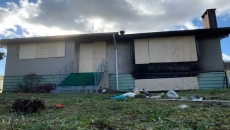REGINA - A new survey suggests Canadians are becoming more divided, with some saying issues have led them to reduce contact with friends or family.
The national phone survey by the Canadian Hub for Applied and Social Research at the University of Saskatchewan was done between March 7 and March 24. It asked 1,011 people about the issues that divide them the most.
About three out of every four respondents said they believe society has become more polarized.
The majority said the COVID-19 pandemic (72 per cent) and the 2021 federal election (73 per cent) were the two most divisive issues over the past year.
About 40 per cent of those surveyed said they have reduced contact with friends or family over an argument about the pandemic or politics.
"There's been so much amplified rhetoric in the last two years since the beginning of the pandemic, and a lot of the rhetoric has really served to divide folks — whether that division is actually real or it's just perceived," research director Jason Disano told The Canadian Press in a phone interview from Saskatoon.
Disano said the respondents' answers seems to be influenced by their political lean.
For example, in the Prairie provinces, respondents answered in ways that align with conservative policies, Disano said.
The survey suggested people on the Prairies were more likely than in any other region to believe that the issues of fighting climate change and banning assault weapons were dividing Canadians. In Central Canada, however, respondents didn't think a ban on weapons was a divisive topic.
"We see a lot of identity politics that's taking hold in Canada, that has been taking hold in the U.S., particularly in the last five to six years," Disano said. "And we're seeing sort of that carryover to Canada. And it's a problem."
Respondents in Quebec were more likely than those in other regions to believe society has become less polarized. Disano attributed that result to more moderate or liberal views.
Quebec residents who participated in the survey also said they were less likely than people in Western Canada, including British Columbia, to have reduced contact with a friend or family member because of differing views.
"We do see these regional differences, which to a large extent are informed by the political leanings of the residents of those various regions," Disano said.
"Unfortunately, what we're seeing is politicians that are using that division for political benefit when those leaders should be seeking to unite us and not divide us."
When it comes to uniting Canadians, the respondents said provisions of international aid (55 per cent) and increasing ethnic diversity (53 per cent) were issues that brought them together.
The survey was reliable to within plus or minus three per cent, with a 95 per cent confidence level.






